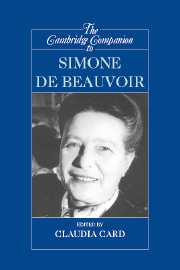Book contents
- Frontmatter
- Introduction: Beauvoir and the ambiguity of “ambiguity” in ethics
- 1 Beauvoir’s place in philosophical thought
- 2 Reading Simone de Beauvoir with Martin Heidegger
- 3 The body as instrument and as expression
- 4 Beauvoir and Merleau-Ponty on ambiguity
- 5 Bergson’s influence on Beauvoir’s philosophical methodology
- 6 Philosophy in Beauvoir’s fiction
- 7 Complicity and slavery in The Second Sex
- 8 Beauvoir on Sade: making sexuality into an ethic
- 9 Beauvoir and feminism: interview and reflections
- 10 Life-story in Beauvoir’s memoirs
- 11 Beauvoir on the ambiguity of evil
- 12 Simone de Beauvoir: (Re)counting the sexual difference
- 13 Beauvoir and biology: a second look
- 14 Beauvoir’s Old Age
- Bibliography
- Index
5 - Bergson’s influence on Beauvoir’s philosophical methodology
Published online by Cambridge University Press: 28 May 2006
- Frontmatter
- Introduction: Beauvoir and the ambiguity of “ambiguity” in ethics
- 1 Beauvoir’s place in philosophical thought
- 2 Reading Simone de Beauvoir with Martin Heidegger
- 3 The body as instrument and as expression
- 4 Beauvoir and Merleau-Ponty on ambiguity
- 5 Bergson’s influence on Beauvoir’s philosophical methodology
- 6 Philosophy in Beauvoir’s fiction
- 7 Complicity and slavery in The Second Sex
- 8 Beauvoir on Sade: making sexuality into an ethic
- 9 Beauvoir and feminism: interview and reflections
- 10 Life-story in Beauvoir’s memoirs
- 11 Beauvoir on the ambiguity of evil
- 12 Simone de Beauvoir: (Re)counting the sexual difference
- 13 Beauvoir and biology: a second look
- 14 Beauvoir’s Old Age
- Bibliography
- Index
Summary
The topic of this chapter, the early philosophical influence of Henri Bergson (1859-1941) on Simone de Beauvoir, may surprise those who remember Beauvoir's reference to Bergson in her Memoirs of a Dutiful Daughter where she denies Bergson's importance. She writes there of her interests in 1926: “I preferred literature to philosophy, and I would not have been at all pleased if someone had prophesized that I would become a kind of Bergson; I didn't want to speak with that abstract voice which, whenever I heard it, failed to move me.”
But in this case, as in so many others, Beauvoir's diaries present a very different picture. Her unpublished diary of 1926, written when she was 18 years old and beginning her study of philosophy, contains several pages of quotations from Bergson's Time and Free Will: An Essay on the Immediate Data of Consciousness (1889), which she describes, in an entry dated 16 August, as “a great intellectual intoxication.” The entry continues:
whereas in reading other philosophers I have the impression of witnessing more or less logical constructions, here finally I am touching palpable reality and encountering life. Not only myself, but art, the truths suggested by poets, and everything that I studied this year is magnificently explained. Simply a call to intuition . . . in short the method that I spontaneously apply when I want to know myself and the most difficult problems disappear. How many things [there are] in the 180 pages of Bergson’s Time and Free Will: The Immediate Givens of Consciousness.
- Type
- Chapter
- Information
- The Cambridge Companion to Simone de Beauvoir , pp. 107 - 128Publisher: Cambridge University PressPrint publication year: 2003
- 7
- Cited by

